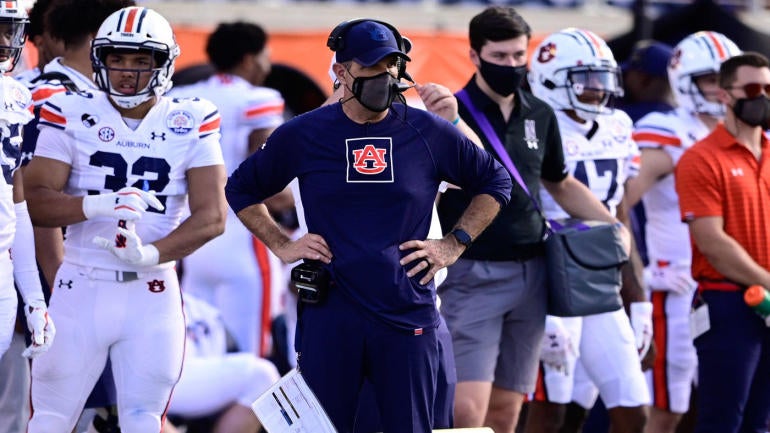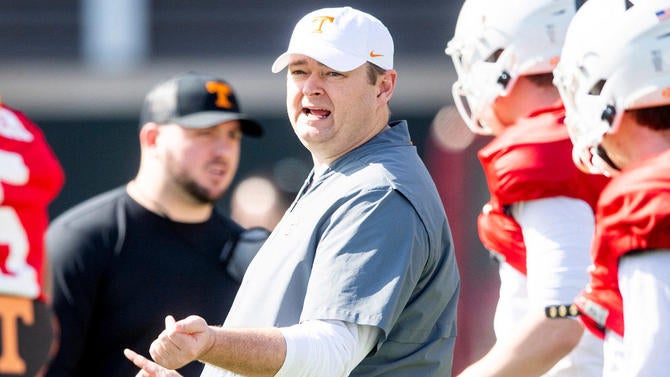
With Kansas hiring Lance Leipold, the college football coaching carousel finally settled for the 2020-21 cycle. We often look at these coaching classes like a draft classes -- grading the hires and then returning years later to re-grade with some perspective and results to aid the analysis. Since it's late May and everyone's feeling the graduation, end-of-school vibes, we thought it would be fun to break down the 2020-21 coaching class like a graduating class with superlatives.
While we were tempted to go all in on the motif and identify "Best Hair" (this group has a lot of high-and-tight cuts), "Biggest Flirt" (Bret Bielema, duh) and more of the classic senior superlatives, we're going to focus on awards and groupings that make the most sense for this college football coaching conversation.
Most likely to win big early
Bryan Harsin, Auburn
Gus Malzahn, UCF
It's unintentional to tie both Gus Malzahn's old program and his new program together with high expectations for 2021, but both coaches inherit situations are either at or not far separated from a championship level. Specifically, both coaches take over offenses with a starting quarterback in place and a level of talent across the roster that give both teams a pretty high floor. Now both teams do have a problem in their own conferences with a rival that's currently the ruling power in the league -- Alabama for Auburn and Cincinnati for UCF -- but there's been enough recent success for the 2021 underdog in both of those head-to-head series to believe a quick return to the top is possible. Odds would favor Malzahn winning a conference championship before Harsin, but I could see either contending for a College Football Playoff spot in the first three years.
Most likely to win big later
Steve Sarkisian, Texas
Why should Sark have to wait for delayed success? They have an Oklahoma problem in the Big 12 similar to the Alabama problem in the SEC, so why can't the Longhorns have immediate success? First, Sarkisian is not taking over an offense with an established starting quarterback, and he does not have the recent head coaching experience of Harsin or Malzahn. I think it's more fair to Sark to delay some of those championship expectations as he reacquaints himself to the head job and settles into the new routines and rhythms that will allow him to meet those expectations. There's no doubt Texas has College Football Playoff and even national championship potential with Sarkisian, though while he has the highest ceiling of the 2020-21 class, I think the real rewards of his tenure are at least a few years down the road.
Can the results match the name?
Bret Bielema, Illinois
Butch Jones, Arkansas State
Between 2007 and 2012, these two coaches combined to win seven conference championships before moving to the SEC in the same year (2013) and each being dismissed during or immediately after the conclusion of Year 5. The path back to being a head coach took Bielema to the NFL while Jones worked for Nick Saban at Alabama, and now each gets another chance at reaching the expectations set by their early success in coaching. Bielema clearly carries a different set of expectations at Illinois than Jones at Arkansas State, both in terms of the competition in the conference and the state of the program compared to its peers. But both fanbases are expecting to see results in line with bringing in coach with championships on his resume.
Toughest rebuild
Lance Leipold, Kansas
Jedd Fisch, Arizona
One of the reasons to be excited about Leipold's hire at Kansas is the work he did to transform the Buffalo football program. It's not not likely we see the Jayhawks playing for conference championships by the end of Year 4 like the Bulls were in the MAC, but the approach to program-building he brought to a school that had just two bowl appearances prior to his arrival could lead to some lasting change in Lawrence. Arizona has seen somewhat recent success compared to the 12-year bowl drought currently in place at Kansas, but the high floor of the Rich Rodriguez era turned into a bottoming out situation following his dismissal and three years of Kevin Sumlin trying to patch things back together. Sumlin went 9-20, never made a bowl game and the Wildcats have finished dead last in the Pac-12 South each of the last two seasons.
Longest leash
Shane Beamer, South Carolina
Clark Lea, Vanderbilt
While there is certainly a rebuilding -- or at least remodeling -- angle to what's in store for both South Carolina and Vanderbilt, the hires made by both schools had a familial nature that can lead to a longer leash, or at least more patience in the program-building process. Beamer was an assistant under Steve Spurrier for four years during the early stages of what would become one of the most successful periods in South Carolina football history. As recruiting coordinator, Beamer helped bring in NFL-caliber players like Alshon Jeffery and Stephon Gillmore, and there's a real momentum behind the idea that he knows the lay of the land in a unique way that can help South Carolina level up again. Lea brings even more of a family atmosphere as a Vanderbilt alum and Nashville native, and both of these coaches are under the age of 45 and in their first head coaching job. You have always more patience for family members than strangers, especially when they're trying to figure something out for the first time. That's going to lead to a longer leash for these two new arrivals in the SEC.
Shortest leash
Josh Heupel, Tennessee
The circumstances of Jeremy Pruitt's mid-January firing amid an internal investigation into alleged recruiting violations raise all kind of questions about the many factions in and around Tennessee football. Danny White being hired away from UCF to be the new athletic director likely did facilitate an easy vetting process when he hired Heupel for the second time, but I'm not ready to say that relationship is reason enough to think he's got a long leash or plenty of time to get things moving in the right direction. An exodus of transfers has created talent and depth issues that have to be addressed immediately before Tennessee finds itself with a rapidly-widening gap between itself and the teams it considers peers (Florida, Georgia and, yes, Alabama). Unlike fellow new arrivals Beamer and Lea, this is not Heupel's first time as a head coach. If the early on-field results are more in line with South Carolina and Vanderbilt than, say, Missouri and Kentucky, then it's going to get tense in Knoxville.

Easiest program to maintain
Andy Avalos, Boise State
Go all the way back to Dirk Koetter and the Big West Conference in 1999, and you won't find more than two consecutive years where Boise State did not win at least a share of the conference championship. The conferences and coaches have changed, but from Koetter to Dan Hawkins to Chris Petersen to Bryan Harsin, Boise State continually pops up with 10-win seasons and opportunities to win championships on an annual basis. So when Avalos, the team's leading tackler and a first team All-WAC linebacker for the Broncos in the early 2000s, was hired as Harsin's replacement, we transferred those same expectations onto a young coach who knows exactly what it takes to win in Boise.
Toughest program to maintain
Maurice Linguist, Buffalo
It's tough to spend months preparing to be the co-defensive coordinator for Michigan, and then in May decide to switch out all of those binders for your first head coaching job. Lance Leipold not only did a fantastic job of building up the Bulls' program, but he left with several assistants and took them with him to Kansas. Linguist spent two years (2012-13) on Jeff Quinn's staff at Buffalo, but he was not intimately involved with the program's rise to MAC championship contention. The late-cycle hire means even less time to get accommodated with the environment and hurts the chances of being able to keep the Bulls at the top of the conference.
Power Five candidate
Blake Anderson, Utah State
Utah State is a pretty good landing spot for Anderson, who was looking for a fresh start. In seven years at Arkansas State, the Red Wolves won two Sun Belt championships, another division title and appeared in six straight bowl games under his watch. If he is able to replicate that kind of success with the Aggies in the Mountain West, he will quickly move up the list of potential candidates to make the jump from the Group of Five to the Power Five in future coaching cycles.
Longest tenure
Will Hall, Southern Miss
Charles Huff, Marshall
Kane Wommack, South Alabama
Some of this projection has to do with runway, as Hall is the eldest of the group at 41 years old and Wommack is the youngest at 34 years old. For Huff and Wommack, this is also their first head coaching job while Hall has head coaching experience (and head coaching success) at the Division II level. These hires are intended to allow the coach to grow as a professional and help bring either stability or a new direction to their new program. Southern Miss, Marshall and South Alabama would love to know they've got their football coach locked down for years to come. But, as always, the threat of too much success could lead to a short stay for their new hire.
Shortest tenure
Terry Bowden, ULM
Two years as a graduate assistant -- yes, you read that right, graduate assistant -- have given Bowden some new perspectives to bring to his return to head coaching. Still, this is a 65-year old coach taking over a program that has not been to a bowl game since 2012. Bowden can bring plenty of experience and guidance, but whether he's the right person for the job over a six-year or seven-year span is yet to be seen.
















